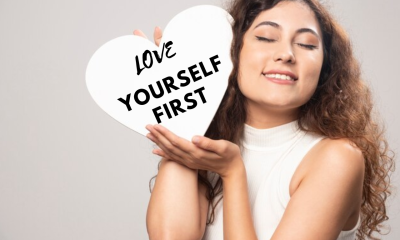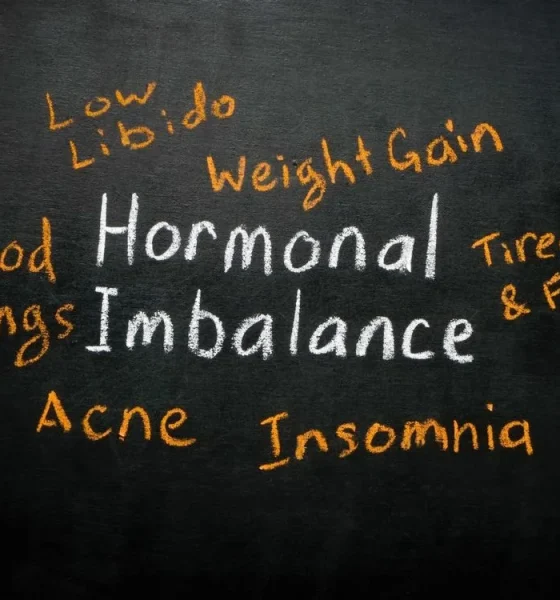Mindfulness
Why You Should Love Yourself

Why You Should Love Yourself
In a world that often pushes us to achieve more, give more, and do more, it’s easy to forget the importance of self-love. Loving yourself is not just about feeling good; it’s about building a strong foundation for happiness, resilience, and overall well-being. Why you should love yourself goes beyond self-care trends and becomes a critical aspect of living a balanced and fulfilling life.
Self-love can empower you to navigate life’s challenges, enhance relationships, and unlock your full potential.
- Self-Love Builds Confidence and Self-Worth
You begin to appreciate your special traits, abilities, and capabilities when you learn to love yourself. This knowledge increases self-worth by boosting confidence and cultivating a good self-image. Imagine walking into a crowded room knowing that you are worthwhile because you truly believe it, not because of what other people think. Self-love is the source of that inner confidence rather than approval from others.
Self-love encourages you to appreciate yourself fully, including your imperfections. It’s about realizing that you are valuable in your current state. You may overcome the incessant desire for approval—at work, in relationships, or even on social media—by accepting the reasons you should adore who you are. You build a solid foundation of confidence and self-worth by learning to find validation within rather than seeking it from others.
- Loving Yourself Leads to Healthier Relationships
You create the conditions for more wholesome relationships when you practice self-love. We frequently turn to other people to satisfy our needs or give us a sense of completion. But depending on someone else to make us happy or make us feel valuable can result in reliance, miscommunication, and even animosity. You become more self-sufficient and relationships become an asset to your happiness rather than a cause of it when you learn to love yourself first.
It will be simpler to establish boundaries, speak clearly, and create relationships based on respect if you know why you should love yourself. Better boundaries in relationships result from self-love, which promotes respect for your own time, effort, and wellbeing. You’re less inclined to say “yes” when you mean “no” or to overextend yourself. Consequently, you establish an environment in which you and people around you can flourish.
- Self-Love Enhances Mental Health and Resilience
Mental health is significantly impacted by self-love. Self-care activities that support your mind, body, and soul are more likely to be practiced when you love yourself. Exercise, journaling, and meditation are examples of activities that promote mental health in addition to physical health. Negative self-talk, which frequently causes stress, worry, and even despair, can be lessened with self-love.
Knowing why you should love yourself makes you more capable of overcoming obstacles in life. Resilience is cultivated by self-love, which enables you to overcome failures and errors. You’ll learn to treat oneself with kindness instead of self-criticism, which is crucial for emotional stability. Having a foundation of self-love enables you to grow, learn, and forgive yourself instead of focusing on the bad when faced with challenges.
- Loving Yourself Fuels Personal Growth
One essential component of personal development is self-love. You are more inclined to pursue objectives, desires, and dreams that are consistent with your true self when you are in love with yourself. Because self-love gives you the confidence to take chances and realize that your value isn’t dependent on any one result, you become less fearful of failing. By adopting a development mentality, you can realize your greatest potential.
People who understand why you should love yourself are more willing to invest in themselves, whether through learning new skills, exploring passions, or working on personal development. Self-love allows you to approach life with curiosity, enthusiasm, and a willingness to improve.
Building a happy and balanced life requires knowing why you should embrace who you are. Self-love is a source of strength that enhances all facets of your life, from relationships and work to mental health and personal well-being. It is not selfish. You may empower yourself to be more resilient, happier, and healthier by adopting self-love. Start by appreciating your individuality, establishing limits that preserve your tranquility, and performing little acts of self-compassion. You’ll eventually learn that the first step to real happiness and personal development is learning to love who you are.
Resources
Hidden Signs of Hormonal Imbalance & How to Fix It Naturally

Hidden Signs of Hormonal Imbalance & How to Fix It Naturally
Hormones play a crucial role in regulating various bodily functions, from metabolism and mood to skin health and reproductive health. However, an imbalance in hormones can lead to several health issues that often go unnoticed. Identifying the hidden signs of hormonal imbalance early can help you take the right steps toward restoring balance naturally.
Hidden Signs of Hormonal Imbalance
- Unexplained Weight Gain or Loss
If you’re gaining or losing weight without changing your diet or activity levels, it could be a sign of fluctuating hormones. Insulin, cortisol, thyroid hormones, and sex hormones all play a role in metabolism. An imbalance in these hormones may lead to sudden weight changes. - Persistent Fatigue
Feeling exhausted even after a full night’s sleep? Chronic fatigue is one of the hidden signs of hormonal imbalance and may be linked to low thyroid function, adrenal fatigue, or fluctuating blood sugar levels. - Mood Swings & Anxiety
Excessive stress, anxiety, irritability, or depression can be linked to imbalances in estrogen, progesterone, and cortisol. Many women experience mood fluctuations due to hormonal shifts, especially during PMS, pregnancy, or menopause. - Skin Issues & Acne Breakouts
If you’re experiencing acne, dry skin, or excessive oiliness beyond your teenage years, your hormones could be to blame. Androgens, such as testosterone, can cause excess sebum production, leading to persistent breakouts. - Digestive Problems
Hormones like cortisol and estrogen influence gut health. High stress levels can lead to bloating, constipation, or diarrhea, indicating a hidden sign of hormonal imbalance that needs attention.
How to Fix Hormonal Imbalance Naturally
- Prioritize a Balanced Diet
Eating a nutrient-dense diet rich in healthy fats, fiber, and proteins can support hormonal health. Include foods like avocados, flaxseeds, nuts, and leafy greens to regulate estrogen and progesterone levels. - Manage Stress Effectively
Chronic stress leads to elevated cortisol levels, which can disrupt other hormones. Practicing yoga, meditation, and deep breathing exercises can help keep stress in check and restore balance. - Get Quality Sleep
Lack of sleep can cause a spike in cortisol and disrupt insulin levels. Aim for 7-9 hours of restful sleep every night to support optimal hormonal function. - Exercise Regularly
Physical activity helps balance insulin, cortisol, and sex hormones. Strength training, yoga, and cardio workouts can all contribute to maintaining hormonal equilibrium. - Use Natural Supplements
Certain supplements like magnesium, omega-3 fatty acids, and adaptogenic herbs (such as ashwagandha and maca root) can help support hormonal balance naturally. - Limit Toxin Exposure
Endocrine-disrupting chemicals (EDCs) found in plastic, processed foods, and beauty products can interfere with hormone production. Switching to organic skincare, using glass containers, and avoiding processed foods can reduce exposure to harmful toxins.
Recognizing the hidden signs of hormonal imbalance early on can prevent long-term health issues. By making simple lifestyle changes, such as improving your diet, managing stress, and ensuring quality sleep, you can restore hormonal harmony naturally. If symptoms persist, consulting a healthcare provider can help you get personalized guidance.
Taking control of your hormonal health is the key to feeling energetic, balanced, and thriving in all aspects of life. Start making small changes today and embrace a healthier, more vibrant you!
Mindfulness
How to Overcome Procrastination with the 2-Minute Rule

How to Overcome Procrastination with the 2-Minute Rule
Procrastination is one of the biggest obstacles to productivity. We often delay tasks, waiting for the perfect moment, only to realize that time has slipped away. But what if you could defeat procrastination in just two minutes? The 2-Minute Rule, a simple technique introduced by productivity expert David Allen, can transform the way you approach tasks.
In this blog, we’ll explore how to overcome procrastination with the 2-Minute Rule and make steady progress toward your goals.
What is the 2-Minute Rule?
The 2-Minute Rule is based on a straightforward idea: If a task takes less than two minutes, do it immediately. For tasks that take longer, just commit to starting for two minutes. This approach eliminates excuses and builds momentum, making it easier to complete even the most challenging projects.
Why Does the 2-Minute Rule Work?
Many people struggle with procrastination because tasks seem overwhelming. Our brains resist effort, preferring immediate comfort. How to overcome procrastination with the 2-Minute Rule lies in tricking the brain into action. By focusing only on the first two minutes, you remove the mental resistance that prevents you from starting.
Once you begin, the task no longer feels as difficult. More often than not, two minutes of action lead to continued effort, and before you know it, you’ve made significant progress.
How to Apply the 2-Minute Rule
Here’s how you can implement the 2-Minute Rule in different areas of your life:
- Daily Chores: Instead of leaving dishes in the sink, wash them immediately—it takes less than two minutes.
- Email Responses: If you can reply in two minutes, do it now instead of postponing it.
- Exercise: Put on your workout clothes and commit to just two minutes of movement. Most likely, you’ll continue beyond that.
- Reading: Read one page of a book. Often, you’ll find yourself reading more.
- Work Tasks: Open a blank document and write the first sentence of a report or blog. Getting started is the hardest part.
By following these steps, you’ll see how easy it is to develop new habits and stop delaying important activities. How to overcome procrastination with the 2-Minute Rule is about mastering small wins that create long-term success.
The Science Behind the 2-Minute Rule
Behavioral psychology supports this method. When you take immediate action, you rewire your brain to associate tasks with completion rather than avoidance. Over time, this builds discipline and eliminates the habit of procrastination.
Additionally, the 2-Minute Rule capitalizes on the Zeigarnik Effect, which suggests that once you start a task, your brain feels the need to finish it. This explains why committing to just two minutes often leads to much longer work sessions.
Overcoming Challenges with the 2-Minute Rule
Although the 2-Minute Rule is effective, you may still face challenges. Here’s how to handle them:
- Lack of Motivation: Remind yourself that you’re only committing to two minutes.
- Distractions: Keep your phone away and set a timer to stay focused.
- Negative Mindset: Celebrate small wins to reinforce positive behavior.
By making the 2-Minute Rule a daily practice, you’ll notice a significant shift in your productivity. How to overcome procrastination with the 2-Minute Rule is not just about doing small tasks—it’s about building momentum, creating habits, and achieving big goals one step at a time.
Stress Management
Why Do We Doubt Ourselves?

Why Do We Doubt Ourselves?
Self-doubt is a common mental barrier that affects almost everyone at some point in life. Whether it’s about making career decisions, pursuing passions, or stepping into unknown territories, this inner voice often holds us back from reaching our full potential. But why do we experience self doubt, and how can we overcome it?
The Root Causes of Self-Doubt
- Past Failures and Mistakes
One of the biggest reasons for self-doubt is our past experiences. If we have failed at something before, our mind builds a defense mechanism to avoid similar outcomes. This fear of failure creates hesitation, making us question our abilities even when we are fully capable. - Comparing Ourselves to Others
In the age of social media, comparison has become second nature. Seeing others succeed can sometimes make us feel inadequate. We often forget that people usually showcase their highlights, not their struggles. Constantly comparing our journey with someone else’s can feed self-doubt and make us feel we are not good enough. - Lack of Positive Reinforcement
Encouragement plays a vital role in building self-confidence. If we have grown up or worked in an environment where our efforts were not recognized, it can contribute to self-doubt. The absence of appreciation makes us question our capabilities and hesitate to take risks. - Fear of Judgment
The fear of being judged or criticized by others can fuel self-doubt. We worry about what people will think if we fail or if our decisions do not turn out well. This need for validation often stops us from taking necessary actions. - Perfectionism
Many people experience self-doubt because they aim for perfection. When we set unrealistic expectations for ourselves, any small imperfection makes us believe we are not good enough. This creates a cycle of procrastination and fear of not meeting high standards.
Overcoming Self-Doubt
- Recognize and Challenge Negative Thoughts
The first step to overcoming self-doubt is recognizing when we are experiencing it. Question the negative thoughts—are they based on facts or just fears? Replacing negative self-talk with rational and encouraging thoughts can help boost confidence. - Focus on Small Wins
Every small achievement counts. Instead of waiting for big successes, celebrate small milestones. Each win proves that we are capable and helps to diminish self-doubt over time. - Practice Self-Compassion
Be kind to yourself. Everyone makes mistakes and has doubts. Instead of harshly criticizing yourself, treat yourself with the same kindness and encouragement you would give a friend. - Surround Yourself with Positive Influences
Being around supportive and positive people can help reduce self-doubt. Seek mentors, friends, or communities that uplift you rather than those who reinforce your insecurities. - Take Action Despite Fear
Sometimes, the best way to overcome self-doubt is to take action despite the fear. The more we push through our doubts, the weaker they become. Confidence builds through experience and persistence.
Finally I want to say, Self-doubt is a natural feeling, but it does not have to control our lives. By understanding its root causes and actively working to overcome it, we can move forward with confidence and achieve our goals. Remember, even the most successful people have faced self doubt, but they didn’t let it stop them. You are capable of more than you think—believe in yourself!
-

 Healthy Habits5 months ago
Healthy Habits5 months ago5 Morning Routines for Maximum Energy
-

 Sustainable Living5 months ago
Sustainable Living5 months agoImportance of Self-Love in Mental Health
-

 Healthy Habits5 months ago
Healthy Habits5 months agoBest 6 Ways to Stay Mentally and Physically Healthy
-

 Stress Management5 months ago
Stress Management5 months agoBalancing Multiple Roles: How Trying to Be the Best in All Areas Leads to Feeling Stretched
-

 Mindfulness6 months ago
Mindfulness6 months agoMindfulness
-

 Mindfulness6 months ago
Mindfulness6 months ago“Practice of Mindfulness: Unlock the Power of Empowering Self”.
-

 Meditation Practices5 months ago
Meditation Practices5 months agoOsmosis App for Pharma Students is a Must-Have Tool
-

 Healthy Habits5 months ago
Healthy Habits5 months agoMenstrual Cycle Journal to Empower Your Health













